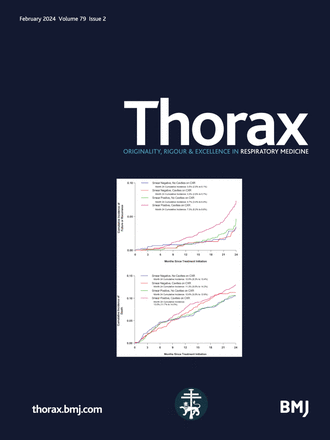英国急症医院提供的全国选择退出烟草依赖治疗服务公平吗?一项全国性队列研究
IF 7.7
1区 医学
Q1 RESPIRATORY SYSTEM
引用次数: 0
摘要
吸烟的人比不吸烟的人入院的可能性要高三分之一。最贫困人口和最贫困人口之间的吸烟率差距仍然存在。医院发起的治疗可以减少与吸烟有关的不平等,如果入院的较贫困人口有更多的机会和接受治疗并成功戒烟。英国的国民健康服务(NHS)已经引入了“选择退出”烟草依赖治疗,在这项研究中,我们研究了烟草依赖治疗与剥夺之间的差异。方法数据来自英国111家(84%)急性医院信托,描述了2024年入院的244847名吸烟者,总计185147人。我们回顾了个体是否进行了支持戒烟尝试和成功戒烟,并使用逻辑回归来确定这些结果是否根据患者居住的剥夺程度而有所不同。结果经人口统计学特征和医院聚类调整后的数据表明,在贫困程度较高的五分位数中,尝试戒烟的比例较高,第一分位数(最贫困)为24.8%,第五分位数(最贫困)为18.3%;然而,在最贫困的五分之一人群中戒烟的比例最高(25.3%),最贫困的五分之一人群戒烟的比例为16.0%。结论:NHS选择退出住院患者烟草依赖服务在公平的基础上为剥夺五分之一的患者提供治疗,在最剥夺的五分之一中,患者支持戒烟的比例最大。然而,有机会通过提高这一群体的戒烟成功率来减少不平等。如有合理要求,可提供资料。这些数据保存在英国国家医疗服务体系内,可以通过数据访问请求服务(DARS-NHS英格兰数字)请求。本文章由计算机程序翻译,如有差异,请以英文原文为准。
Is the provision of a national opt-out tobacco dependence treatment service in acute hospitals in England equitable? A national cohort study
Introduction People who smoke are a third more likely to be admitted to hospital than non-smokers. A disparity in smoking prevalence between the most and least deprived populations persists. Hospital-initiated treatment could reduce smoking-related inequalities if people admitted to hospital from more deprived populations have greater access and uptake of treatment and successfully quit. The National Health Service (NHS) in England has introduced ‘opt-out’ tobacco dependency treatment and in this study, we examined how treatment of tobacco dependency differed in relation to deprivation. Methods Data were available from 111 (84%) acute hospital trusts in England, describing 243 847 hospital admissions of people who smoked in 2024, a total of 185 147 individuals. We reviewed whether individuals had made a supported quit attempt and successful quits and used logistic regression to determine if these outcomes differed according to level of deprivation based on patient residence. Results Data adjusted for demographic characteristics and hospital clustering demonstrated that the proportion of those making quit attempts was higher in more deprived quintiles of deprivation, 24.8% in quintile 1 (most deprived) versus 18.3% in quintile 5 (least deprived); however, the proportion of people who quit smoking was highest in the least deprived quintile (25.3%) with a gradient to the most deprived quintile (16.0%). Conclusion The NHS opt-out inpatient tobacco dependency service provides treatment on an equitable basis across deprivation quintiles, with the greatest proportion of patients making a supported quit attempt in the most deprived quintile. However, there are opportunities to reduce inequalities by improving quit success in this group. Data are available upon reasonable request. The data are held within NHS England and can be requested through the Data Access Request Service (DARS—NHS England Digital).
求助全文
通过发布文献求助,成功后即可免费获取论文全文。
去求助
来源期刊

Thorax
医学-呼吸系统
CiteScore
16.10
自引率
2.00%
发文量
197
审稿时长
1 months
期刊介绍:
Thorax stands as one of the premier respiratory medicine journals globally, featuring clinical and experimental research articles spanning respiratory medicine, pediatrics, immunology, pharmacology, pathology, and surgery. The journal's mission is to publish noteworthy advancements in scientific understanding that are poised to influence clinical practice significantly. This encompasses articles delving into basic and translational mechanisms applicable to clinical material, covering areas such as cell and molecular biology, genetics, epidemiology, and immunology.
 求助内容:
求助内容: 应助结果提醒方式:
应助结果提醒方式:


